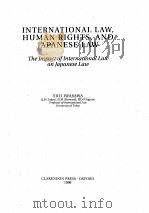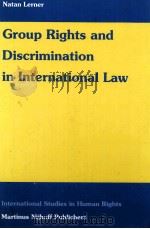《INTERNATIONAL LAW,HUMAN RIGHTS,AND JAPANESE LAW》
| 作者 | YUJI IWASAWA 编者 |
|---|---|
| 出版 | CLARENDON PRESS·OXFORD |
| 参考页数 | 355 |
| 出版时间 | 1998(求助前请核对) 目录预览 |
| ISBN号 | 0198259123 — 求助条款 |
| PDF编号 | 813662948(仅供预览,未存储实际文件) |
| 求助格式 | 扫描PDF(若分多册发行,每次仅能受理1册) |

Ⅰ.Introductory Chapter1
A.Purpose1
B.Attitude of Japan towards LawMaking on Human Rights and Its Supervision5
Ⅱ.The TreatyMaking Process in Japan12
A.Approval of Treaties by the Diet12
1.Process of Approval12
2.Subsequent Approval13
3.Effect of Disapproval14
4.Power of the Diet to ‘Amend’ a Treaty16
5.Reservations and Interpretative Declarations18
B.‘Treaties’ and ‘Executive Agreements’19
C.Implementation of Treaties in Japan25
1.Publication of Treaties25
2.Implementation of Treaties27
Ⅲ.The Status of Ⅲnternational Law in Japan28
A.Domestic Legal Force of International Law28
B.Finding of International Law by Japanese Courts34
C.Binding Character of International Instruments37
D.Progressive Character of Human Rights Treaties40
1.International Covenant on Civil and Political Rights40
2.International Covenant on Economic, Social and Cultural Rights41
3.Convention on the Elimination of Discrimination against Women43
E.Direct Applicability of International Law in Japan44
1.Doctrines of Direct Applicability of International Law44
2.International Covenant on Civil and Political Rights49
(a) View of the Government49
(b) Cases51
(c) Critique53
3.International Covenant on Economic, Social and Cultural Rights56
4.Other Human Rights Conventions61
(a) Convention on the Elimination of Discrimination against Women61
(b) Convention on the Rights of the Child63
(c) International Convention on the Elimination of Racial Discrimination66
5.The General Agreement on Tariffs and Trade and the Agreement Establishing the World Trade Organization66
(a) The Kobe Jewellery case67
(b) The JapanUS Textile Agreement litigation of 197168
(c) The Kyoto Necktie case68
6.Customary International Law77
F.Indirect Application of International Law81
1.Use of International Law in the Interpretation of Domestic Law81
2.ThirdParty Effect (Drittwirkung)89
G.External Application of International Law92
H.Rank of International Law95
1.Relation to Statutes95
2.Relation to the Constitution96
I.Judicial Review of Treaties100
J.Legal Effect in Japan of Acts of International Organs103
1.NormCreating Acts of International Organs105
2.Adjudicatory Acts of International Organs107
Ⅳ.The Impact of International Human Rights Law on Resident Aliens in Japan123
A.Introduction123
B.Historical Background124
C.Aliens and International Human Rights Law125
1.Universal Declaration of Human Rights126
2.International Covenant on Civil and Political Rights127
3.International Covenant on Economic, Social and Cultural Rights128
D.Nationality of Koreans in Japan130
1.Loss of Japanese Nationaliry by the Peace Treaty of 1951130
2.Are Koreans in Japan Minorities under International Law?134
3.Problems in Acquisition of Japanese Nationality137
(a) Acquisition at birth137
(b) Naturalization and the question of names138
E.Immigration Control141
1.Qualification to Stay141
2.Deportation144
3.Re-entry146
F.Alien Registration150
1.Fingerprinting150
2.Alien Registration Certificate157
G.Substantive Rights160
1.Political Rights160
(a) Right to vote160
(b) Public service employment161
2.Economic Rights166
3.Social Rights167
(a) Livelihood protection168
(b) National health insurance169
(c) National pension171
(d) Other benefits174
4.War Compensation to Aliens176
(a) The Taiwanese Soldiers case178
(b) The litigation surge in Japanese courts179
(c) International concern184
5.Education192
(a) Japanese schools192
(b) Korean schools196
6.Discrimination by Private Individuals200
H.Conclusion201
Ⅴ.The Impact of International Human Rights Law on Women in Japan205
A.Introduction205
B.Japan and the Convention on the Elimination of Discrimination against Women206
1.Negative Attitude of Japan towards the Convention in the Initial Stages207
(a) Drafting of the Convention207
(b) Signature and ratification of the Convention208
2.Consideration of Japan’s Reports by the CEDAW209
C.Changes Made Upon Ratification of the Convention211
1.Employment213
(a) Enactment of the Equal Employment Opportunity Law in 1985213
(b) Some features of the Equal Employment Opportunity Law216
(c) Effects of the Equal Employment Opportunity Law221
(d) Enactment of the Childcare Leave Law in 1991 and its revision in 1995224
2.Nationality226
3.Education228
(a) Home economics228
(b) School system230
D.Other Changes Made231
1.Private International Law231
2.Civil Law233
(a) Amendments to the Civil Code in 1976 and in 1980233
(b) Issues under discussion233
3.Other Areas243
(a) Social security243
(b) Participation in public life244
E.Conclusion246
Ⅵ.The Impact of International Human Rights Law on Detention in Japan249
A.Detention of Mental Patients249
1.Treatment of Mental Patients under the 1950 Mental Hygiene Law249
2.International Concern252
3.Revision of the Mental Hygiene Law in 1987256
B.Criminal Detention260
1.‘Substitute Prisons’—Detention of Criminal Suspects in Police Custody Cells260
(a) The system of ‘substitute prisons’260
(b) International concern264
2.Right of Criminal Suspects to Counsel271
(a) Right to a Stateappointed counsel271
(b) Restrictions on visits by counsel274
3.Other Questions Concerning Criminal Justice277
(a) Release on bail277
(b) Right to communicate with the outside world279
(c) Cost of interpretation during court proceedings283
C.Conclusion285
Ⅶ.Concluding Chapter288
A.The Relationship between International Law and Japanese Law288
B.Impact of International Law on Japanese Law292
1.Reluctance of the Courts to Deal with International Human Rights Law292
(a) Tendency of the courts to ignore arguments based on international human rights law292
(b) Tendency of the courts to summarily dismiss arguments based on international human rightslaw294
(c) Reluctance of the courts to find violations of international human rights law299
(d) Japanese courts and the practice of judicial restraint303
2.Revision of Domestic Law in Accordance with International Law306
(a) Revision of domestic law upon ratification of treaties306
(b) Use of litigation as a means to achieve further revision of domestic law307
(c) The impact of discussion in the UN Commission on Human Rights and fact-finding missions by nongovernmental organizations308
3.Revolution or Accommodation309
elect Bibliography313
cdex343
1998《INTERNATIONAL LAW,HUMAN RIGHTS,AND JAPANESE LAW》由于是年代较久的资料都绝版了,几乎不可能购买到实物。如果大家为了学习确实需要,可向博主求助其电子版PDF文件(由YUJI IWASAWA 1998 CLARENDON PRESS·OXFORD 出版的版本) 。对合法合规的求助,我会当即受理并将下载地址发送给你。
高度相关资料
-

- Group rights and discrimination in international law
- 1991 M. Nijhoff
-

- Japanese law
- 1992 Butterworths
-

- BROADCASTING LAW AND FUNDAMENTAL RIGHTS
- 1997 CLARENDON PRESS
-

- International Human Rights in Context Law Politics Morals Text and Materials
- 1996 Clarendon Press · Oxford
-

- The Burden of Proof in Comparative and International Human Rights Law Civil and Common Law Approache
- 1998 Kluwer Law International
-

- The Development of International Law by the European Court of Human Rights
- 1988 Manchester University Press
-

- Remedies in International Human Rights Law
- 1999 Oxford University Press
-

- Human Rights and Humanitarian Law the Quest for Universality
- 1997 Martinus Nijhoff Publishers
-

- International Law and United States Law
- 1999 Ashgate Dartmouth
-

- HUMAN RIGHTS AND DEVELOPMENT INTERNATIONAL VIEWS
- 1989 ST.MARTIN'S PRESS
-

- EUROPEAN COMMUNITY LAW AND HUMAN RIGHTS SUGGESTED SOLUTIONS PACK 1988-1990
- 1991 HLT PUBLICATIONS
-

- ACCOUNTABILITY FOR HUMAN RIGHTS ATROCITIES IN INTERNATIONAL LAW
- 1997 CLARENDON PRESS·OXFORD
-

- Natural law and natural rights
- 1955 Southern Methodist University Press
-

- LAW MORALITY AND RIGHTS
- 1983 DREIDEL PUBLISHING COMPANY
提示:百度云已更名为百度网盘(百度盘),天翼云盘、微盘下载地址……暂未提供。➥ PDF文字可复制化或转WORD
